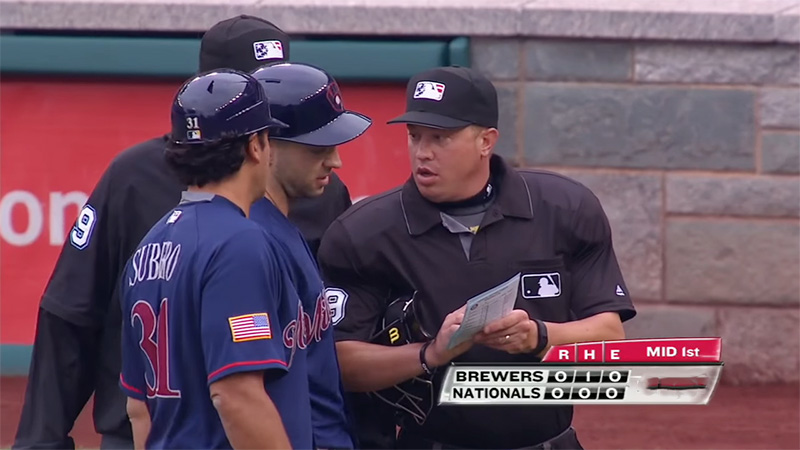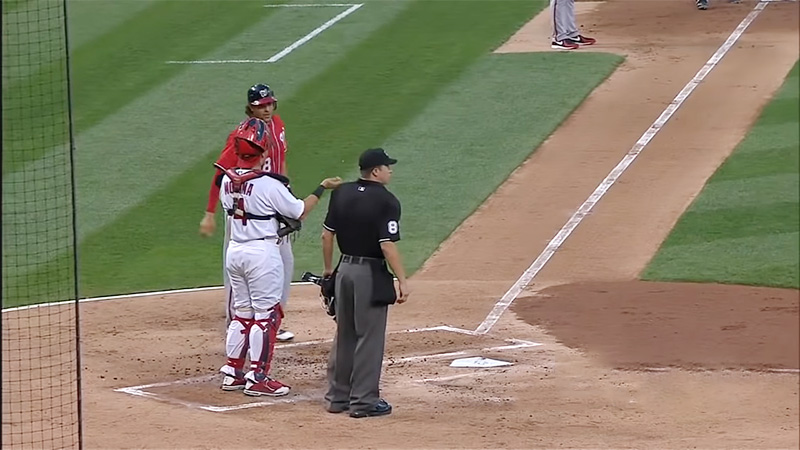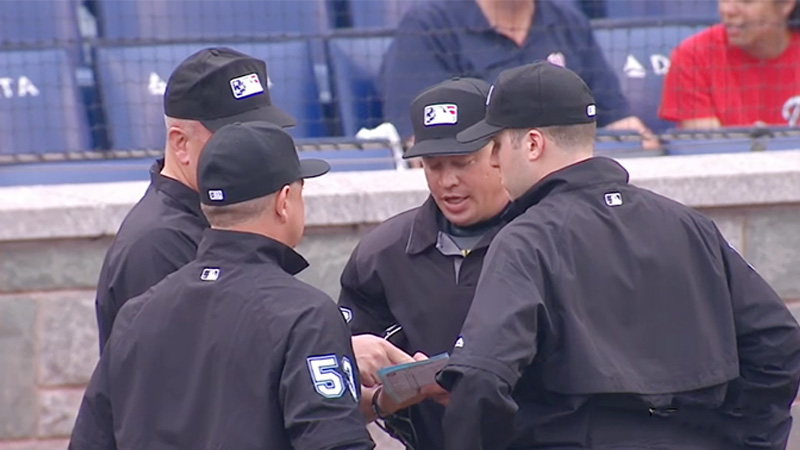In baseball, maintaining the batting order is a fundamental aspect that ensures fairness, strategy, and proper sequencing of player at-bats. However, there are instances when a player may accidentally or intentionally take their turn to bat out of order, leading to what is known as “batting out of turn.”
Batting out of turn can be a complex and confusing concept, with specific rules and consequences governing its occurrence. The implications of batting out of turn are essential for players, coaches, and umpires to ensure the integrity and smooth operation of the game.
In this blog post, we will explore what constitutes batting out of turn, and discuss the causes, consequences, and preventive measures related to this infrequent yet impactful occurrence in baseball. So stay strong and be with us till the end of this article.
What Is Batting Out of Turn?
In baseball, the batting order is crucial for fairness and strategic play. Each team submits a lineup card before the game, indicating the order in which their players will bat.
However, there are instances when a player may mistakenly take their turn to bat out of order, leading to what is known as “batting out of turn.”
Here, we will explore what constitutes batting out of turn, the role of lineup cards in indicating the batting order, and the consequences that arise from this error.
What Constitutes Batting Out of Turn?
Batting out of turn occurs when a player takes their turn to bat in an incorrect order according to the team’s predetermined lineup. The batting order is typically established based on factors such as player skills, strategy, and historical performance.
When a player deviates from this prescribed order, either intentionally or inadvertently, they are considered to be batting out of turn.
Role of Lineup Cards in Batting Order
Lineup cards play a vital role in ensuring that the batting order is followed correctly. Before each game, team managers or coaches submit a lineup card to the official scorekeeper.
This lineup card contains the names of players and their assigned batting order positions. The official scorekeeper then uses this information to announce the batting order to the umpires and the opposing team.
Consequences of Batting Out of Turn

The consequences of batting out of turn depend on whether the opposing team notices the error and makes a timely appeal to the umpire.
If an immediate appeal is made before the next batter receives a pitch or before any play or attempted play, Rule 6.07 (b) comes into play. According to this rule, the umpire takes the following actions:
- Declaration of the proper batter as out: The player who was supposed to bat according to the original lineup is called out.
- Nullification of any actions by the improper batter: Any hits, runs scored, or other on-field consequences resulting from the improper batter’s at-bat are disregarded.
- Correction of the batting order for the next batter: The next batter to come up will be the player who naturally follows the skipped batter in the original lineup.
However, if no appeal is made before the next batter receives a pitch, the batting order is altered for the remainder of the game. The actions of the improper batter are now considered legal, and the new batting order is adjusted accordingly.
Immediate Appeal Scenario
In the event of batting out of turn, if the opposing team notices the error and makes an immediate appeal before the next batter receives a pitch or before any play or attempted play, Rule 6.07 (b) is invoked. This rule outlines the specific actions to be taken by the umpire in such situations.
Rule 6.07 (B)
Rule 6.07 (b) serves as the governing guideline for handling batting out of turn. It states that when an improper batter becomes a runner or is retired, and the defensive team appeals to the umpire on time, certain actions must be carried out to rectify the mistake and restore order to the batting lineup.
Actions of Umpire When an Immediate Appeal is Made
When an immediate appeal is made, the umpire follows the instructions outlined in Rule 6.07 (b) to address the batting out-of-turn situation. These actions include:
Declaration of the Proper Batter as Out
The umpire declares the player who was supposed to bat according to the original lineup as out. This is to ensure that the incorrect batter’s turn is voided and the proper sequence of batters is reinstated.
Nullification of Any Actions by the Improper Batter
Any actions resulting from the improper batter’s at-bat, such as hits, runs scored, or other on-field consequences, are nullified. This is done to ensure fairness and maintain the integrity of the game.
Correction of the Batting Order for the Next Batter
After addressing the immediate appeal, the umpire corrects the batting order for the next batter. The next player to come up at the plate will be the one who naturally follows the skipped batter in the original lineup. This helps restore the intended sequence of batters and ensures that the game proceeds according to the proper order.
By adhering to Rule 6.07 (b) and implementing these actions, the umpire aims to rectify the batting out-of-turn situation promptly and ensure that the game continues with the correct batting order.
No Appeal Scenario

In some cases of batting out of turn, the opposing team may fail to notice the error and make an appeal before the next batter receives a pitch. This scenario leads to a different set of consequences and alterations in the batting order.
Consequences When No Appeal is Made Before the Next Pitch
When no appeal is made before the next pitch, the umpire acknowledges that the batting out of turn has gone unnoticed by the opposing team. As a result, the actions taken by the improper batter are considered legal, and the consequences of their at-bat stand.
Alteration of the Batting Order for the Remainder of the Game
In this situation, the batting order is adjusted for the remainder of the game based on the actions that occurred as a result of the improper batter’s turn.
The new batting order will reflect the outcomes of the at-bat by the improper batter, including hits, runs scored, or other on-field consequences.
Counting of Actions by the Improper Batter
Any hits, runs scored, or other outcomes resulting from the at-bat by the improper batter are counted toward the team’s statistics and score. These actions are considered valid, given that the opposing team did not make a timely appeal to correct the batting out of turn.
It is important to note that the alteration of the batting order and the counting of actions by the improper batter in this scenario are specific to the game at hand.
The new batting order is not carried over to future games or innings but is limited to the remainder of the current game.
The consequences and alterations in the batting order that occurs when no appeal is made in a batting out-of-turn situation, players, coaches, and umpires can better navigate such rare occurrences on the field.
Illustrative Examples of Batting Out of Turn
To further grasp the implications of batting out of turn, let’s consider an illustrative example that showcases a player batting out of turn and the subsequent actions taken by the umpire.
Scenario Involving a Player Batting Out of Turn
Imagine a baseball game between Team A and Team B. The official lineup card indicates the batting order as A-B-C-D-E. However, due to a miscommunication or oversight, player C mistakenly steps up to the plate instead of player B.
Step-By-Step Analysis of the Actions Taken and the Resulting Batting Order
The Improper Batter’s Actions
Player C proceeds to bat and hits a home run, clearing the bases and scoring himself and any runners on base. This action occurs without the opposing team or umpires immediately noticing the batting out of turn.
No Immediate Appeal
Since no appeal is made before the next batter, player D receives a pitch, the umpire acknowledges that the batting out of turn has gone unnoticed.
Alteration of the Batting Order
From this point forward, the batting order is adjusted based on the actions of the improper batter. In this case, player C’s home run and subsequent runs scored are counted, and the batting order is modified to reflect the outcomes of the at-bat.
The new batting order would be A-C-D-E. Player C’s home run is valid and contributes to the team’s score, while player D becomes the next batter following player C.
It’s crucial to recognize that this alteration of the batting order is specific to the current game only and does not carry over to future games or innings.
The umpire’s role is to ensure that the game continues with the correct batting order and that the actions resulting from the batting out of turn are accurately accounted for within the context of the ongoing game.
Rare Occurrences and Implications
Batting out of turn is a relatively rare occurrence in professional baseball. While mistakes can happen, the combination of diligent team managers, vigilant scorekeepers, and experienced umpires helps minimize the frequency of such errors.
How Infrequently Batting Out of Turn Occurs
In professional baseball, teams have well-established protocols and processes to ensure that the batting order is correctly followed.
Lineup cards are carefully prepared and reviewed before each game, leaving little room for errors in the batting order. The rarity of batting out of turn can be attributed to the attention to detail and professionalism of the teams involved.
Role of Team Managers and Scorekeepers in Preventing Errors
Team managers play a critical role in overseeing the lineup and ensuring that players understand and adhere to the batting order. They communicate the lineup to the players and double-check the lineup card before submitting it to the official scorekeeper.
Scorekeepers, in turn, carefully record the batting order and serve as a resource for both teams and umpires during the game. Their attention to detail helps catch any discrepancies or errors before they impact the flow of the game.
Importance of Umpires in Ensuring Fairness and Adherence
Umpires play a pivotal role in maintaining fairness and upholding the rules of the game. When a batting out-of-turn situation arises, umpires must make accurate judgments and enforce the appropriate rules to rectify the error.
Their decisions impact the flow and integrity of the game, and they are entrusted with ensuring that the batting order is corrected promptly and fairly.
Umpires are responsible for actively monitoring the game and responding to appeals from the opposing team. Their expertise and knowledge of the rules are crucial in making the right calls and maintaining consistency in enforcing batting out-of-turn situations.
Their collective efforts contribute to the smooth operation of the game and ensure that fairness and adherence to the rules are upheld at all times.
Causes of Batting Out of Turn
Batting out of turn can occur due to a variety of factors, ranging from miscommunication to human error. Understanding the common causes of batting out of turn can help teams and players take preventive measures to minimize the occurrence of such errors.
Miscommunication or Misunderstanding
One of the primary causes of batting out of turn is miscommunication or misunderstanding among the players, coaches, or team staff.
This can happen when the lineup card is not properly communicated to the players, or there is confusion about the correct order. In some cases, players may mistakenly assume it is their turn to bat or overlook the proper sequence in the lineup.
Changes in the Lineup
Sometimes, last-minute changes to the lineup can lead to batting out of turn. This can occur when a player is substituted or replaced shortly before their scheduled turn to bat, and the new order is not effectively communicated to the player or umpires.
The substitution may disrupt the expected batting order, causing confusion and potential errors.
Administrative Errors
Errors in maintaining the lineup card or inaccurate documentation can also contribute to batting out of turn. This can happen if the lineup card is filled out incorrectly or if there are mistakes during the transcription process.
Inaccurate lineup information can lead to players being unaware of their correct batting order position, resulting in them stepping up to bat out of turn.
Distractions or Lapses in Attention
During a game, distractions or lapses in attention can occur, leading to batting out of turn. This can happen when players are not fully focused on the game situation, or when there are external factors that divert their attention.
In such instances, players may inadvertently go up to bat out of order, unaware of their mistake until it is brought to their attention.
Teams, coaches, and players need to remain vigilant and diligent in their preparation and communication to minimize the likelihood of batting out of turn.
Double-checking the lineup card, clear communication within the team, and maintaining focus throughout the game can help reduce the occurrence of such errors.
Consequences of Batting Out of Turn
The consequences of batting out of turn can have significant impacts on the game. When an improper batter takes its turn at the plate, the immediate consequences depend on whether an appeal is made before the next pitch or play.
If an immediate appeal is made, the umpire follows Rule 6.07 (b) and takes actions such as declaring the proper batter out, nullifying any actions by the improper batter, and correcting the batting order for the next batter.
This ensures that the batting order is restored to its intended sequence and any outcomes resulting from the improper batter’s at-bat are disregarded. However, if no appeal is made promptly, the batting order is altered for the remainder of the game.
The actions of the improper batter are now considered legal, and the new batting order reflects the outcomes of their at-bat.
This can lead to changes in scoring, strategy, and the overall flow of the game. It highlights the importance of teams and players being vigilant in adhering to the correct batting order to avoid these consequential errors.
FAQs
What happens if the batting out of turn is not noticed until several batters have already completed their at-bats?
If the batting out of turn is not noticed until multiple batters have already completed their at-bats, the consequences can vary depending on the league or game rules. In some cases, the umpire may rule that the batting order remains as is, and any actions by the improper batter are counted.
In other cases, the umpire may choose to correct the batting order from that point forward, disregarding the actions of the improper batter.
Can a player intentionally bat out of turn to gain an advantage?
Intentionally batting out of turn to gain an advantage is not a common occurrence and is considered against the spirit of the game. If a player intentionally bats out of turn, it can result in penalties, including the player being called out and potential disciplinary action by the league or governing body.
Can the defense deliberately choose not to appeal a batting out-of-turn situation?
While it is uncommon for the defense to deliberately choose not to appeal a batting out-of-turn situation, it is within their right to do so. If no appeal is made before the next pitch or play, the batting order is altered for the remainder of the game, and the actions of the improper batter are considered legal.
What happens if the umpire mistakenly allows a batter to bat out of turn?
If the umpire mistakenly allows a batter to bat out of turn and the error is realized, the umpire has the authority to correct the situation. Depending on the timing of the error, the umpire may declare the proper batter out and adjust the batting order accordingly, following the guidelines outlined in the rules of the game.
Conclusion
Batting out of turn is a unique and rare occurrence in baseball that can have significant consequences on the flow and fairness of the game.
While batting out of turn is relatively rare in professional baseball, miscommunication, changes in the lineup, administrative errors, and distractions can contribute to these occurrences.
Teams must focus on clear communication, attention to detail, and minimizing distractions to reduce the likelihood of batting out of turn.
If they can stick to the rules, the teams can uphold the integrity of the game and ensure a fair and enjoyable experience for all involved. Thank you for staying with us.







